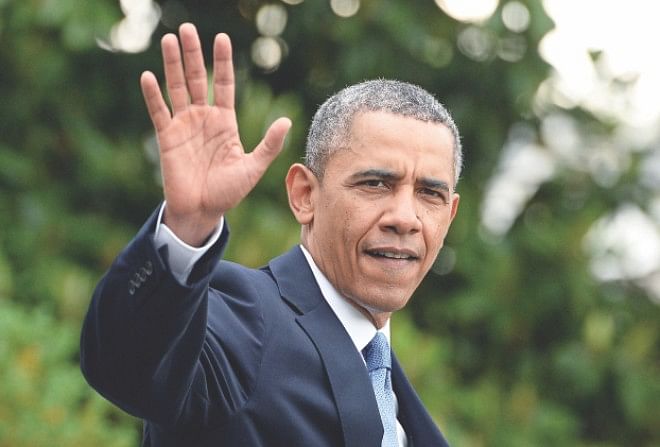US must not rush to war
US must not rush to war
Obama defends his foreign policy, signals policy shift in key issues at hand

President Barack Obama mounted a defiant defense of his global leadership yesterday, rebuking critics who see him as weak but warning that not every global threat justifies a US military response.
In a major speech at the West Point military academy, Obama denied US power had ebbed under his watch, after he withdrew troops from Iraq and as he does the same in Afghanistan.
He also pledged to ramp up support for Syrian rebels, vowed to stand up to Russia over Ukraine and promised to make drone strikes against terror suspects more transparent.
He vowed to hold China accountable to international "rules of the road" in the South China Sea and elsewhere.
"To say that we have an interest in pursuing peace and freedom beyond our borders is not to say that every problem has a military solution," Obama said.
"Since World War II, some of our most costly mistakes came not from our restraint, but from our willingness to rush into military adventures -- without thinking through the consequences," Obama said, in an apparent reference to the Iraq war, which he has branded a disaster.
The president's speech came with his foreign policy, which was once seen as a political asset, under assault from critics who believe he is being outmaneuvered by strongmen like Russian President Vladimir Putin and China's President Xi Jinping.
"Here's my bottom line: America must always lead on the world stage. If we don't, no one else will. The military ... is, and always will be, the backbone of that leadership."
Obama was particularly exercised by those who complain he should have deployed the US military in Syria or made a more robust strategic response to Russia's annexation of Ukraine, or who complain that he has left Iraq or Afghanistan to fend for themselves.
"Tough talk often draws headlines but war rarely conforms to slogans," Obama said.
"But US military action cannot be the only, or even primary, component of our leadership in every instance.
"Just because we have the best hammer does not mean that every problem is a nail," Obama told a graduation ceremony at the college.
Obama also made an implicit defense of his decision to call off military strikes on Syria at the last minute last year to punish chemical weapons strikes. Critics at home and abroad warned that the decision left dangerous questions about whether Washington would stand up to "red lines" elsewhere in the world.
Obama said that he would work with lawmakers to ramp up support for the Syrian opposition, but did not give details, amid reports the US military will begin openly training rebel forces. The CIA is believed to be carrying out a covert program to train and arm some rebels.
Obama also said that terrorism remained the biggest national security threat to the United States and unveiled a new $5 billion fund to equip and train allies on the front lines of the struggle against terrorism, for instance in Africa.
He also defended his decision to leave nearly 10,000 troops in Afghanistan for a year after combat troops leave at the end of this year, and to gradually reduce the presence to a detachment of troops at the US embassy in Kabul by the end of 2016, just before he leaves office.